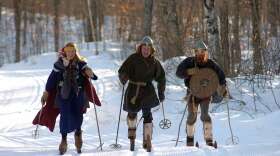A nearly decade-old Wisconsin murder case has recently become the topic of discussion around water coolers and on TV shows and social media around the world. A ten-part series on Netflix based on the case of Steven Avery has drawn in millions of viewers.
Making a Murderer raises questions about whether Avery and his nephew, Brendan Dassey, should have been convicted of the murder of photographer Teresa Halbach in Manitowoc County in 2007. Before the murder, Avery had recently been exonerated in a rape case for which he was wrongfully convicted and had served 18 years in prison. Avery was suing the county and his defense team raised the possibility that he was the target of a frame-up in the murder case.
Reporter Tom Kertscher covered the Avery trial for the Milwaukee Journal Sentinel in 2007, and has been revisiting the case in the paper and on Twitter since the release of the series.
Kertscher says watching the trial and returning to all of the grizzly details reminds him how it "took a lot out of him" during his time covering the Avery case eight years ago. It also brought up doubts as a reporter, wondering if he missed something the documentary was able to uncover.
"We certainly reported the defense theory that Manitowoc sheriff's deputies planted evidence to frame Avery with Teresa Halbach's murder, but seeing it dramatized in the way it was in the film certainly made me more concerned," he says.
However, by the time Kertscher finished watching the series, his doubts diminished. As a reporter, he stresses the point to audiences that while the documentary is compelling, it is also presented through one perspective - Steven Avery's.
"Compare ten hours of film - which is a lot, no doubt - to six weeks of testimony. Viewers are getting one slice, the jury got something quite a bit different," says Kertscher.
He says the success and mass viewing of the series does raise important questions, such as why the Manitowoc country sheriff deputies were involved in the first place while the department, the District Attorney, and the county were being sued by Avery for wrongful conviction when the murder case came up.
Kertscher also notes that the representation, treatment, interrogations and perhaps the coerced confession of Brendan Dassey was "disturbing."
"Viewers are getting one slice, the jury got something quite a bit different." - Reporter Tom Kertscher
Kertscher does not rule out the possibility that parts of this case were mishandled; however, that's not mutually exclusive with the idea that Avery could still have been guilty. The evidence - a majority of it DNA based - led the jury to sentence Avery, but the possibility of mishandling evidence is still indecisive, he says.
"If there's ever going to be new evidence uncovered, analysis of old evidence, someone coming forward whose been quiet all these years..if it's ever going to happen, it's gonna be in the near future, you would think, given all the national and international attention to the case," says Kertscher.
He also states that viewers who are being familiarized with the case through Making A Murderer should not base their opinions of Avery or Wisconsin completely on the series.
"Be careful about drawing conclusions," he says. "Some people watch the film and say justice is completely corrupt in Wisconsin, or innocent until guilty is a fraud in America. And that's a pretty big leap from one case, one movie, to inditing the whole system."
https://www.youtube.com/watch?v=qxgbdYaR_KQ






